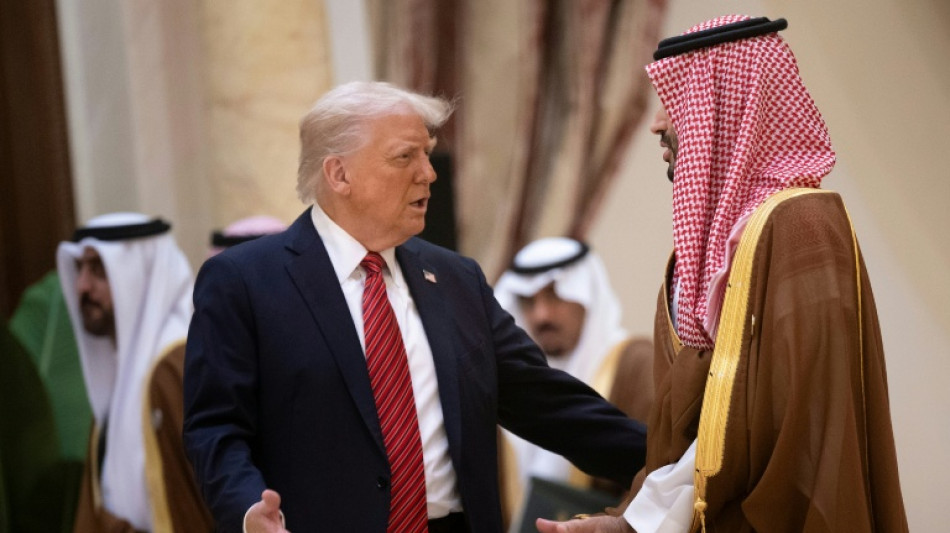
SCS
0.0200


Crown Prince Mohammed bin Salman will press for security guarantees while US President Donald Trump will urge him to normalise ties with Israel when the de facto Saudi ruler breaks a seven-year absence from Washington this week.
Saudi Arabia is unlikely to agree to normalisation at this stage, with Prince Mohammed's priority set for firmer US security guarantees after Israeli strikes in September on Qatar, an iron-clad US ally, rattled the wealthy Gulf region.
"For the Saudis, the goal of this trip... appears to be threefold: to elevate, consolidate, and facilitate security and defence cooperation," wrote Aziz Alghashian from the Washington-based think tank Arab Gulf States Institute.
The 40-year-old heir to the throne is making his first US visit since the 2018 murder of Washington Post columnist Jamal Khashoggi by Saudi agents prompted worldwide outrage and briefly upended ties.
Prince Mohammed is friendly with Trump, a relationship that was burnished by a lavish welcome and $600 billion in investment pledges when Trump visited the world's biggest oil exporter in May.
The visit will last three days starting Monday, with the crown prince to meet Trump on Tuesday, a source close to the government had told AFP, as the Saudi ruler's trips are rarely announced in advance.
A US-Saudi investment forum spotlighting energy and artificial intelligence will take place in Washington during the prince's visit, the event's website says.
- 'We keep being asked' -
Ahead of his arrival, Trump has been vocal about Saudi Arabia, a Middle East heavyweight, recognising Israel by joining the Abraham Accords -- a grand prize for the White House that Riyadh seems unlikely to bestow in the aftermath of the Israel-Hamas war.
"We have a lot of people joining the Abraham Accords and hopefully we are going to get Saudi Arabia very soon," Trump told a business forum in Miami.
Tentative moves towards normalisation, in return for security and energy guarantees, were put on hold after the Hamas attacks on Israel in October 2023 triggered Israel's devastating war in Gaza.
Riyadh appears in no mood to acquiesce in the current climate, especially as it leads an international push for a Palestinian state -- its oft-stated condition for normalising ties.
"A Palestinian state is a prerequisite for regional integration," Manal Radwan, who heads the negotiating team at the Saudi foreign affairs ministry, underlined this month at the Manama Dialogue in Bahrain.
"We have said it many times, and I don't think that we have received a full understanding, because we keep being asked this question," she added.
Instead, the Saudi ruler will seek better US security guarantees.
Doha secured an executive order that Trump signed, vowing to defend Qatar against attacks after Israel's attack -- a deal that experts say other Gulf countries are eager to snatch.
As well as advanced air and missile defence systems, Riyadh is reportedly seeking to buy F-35 fighter jets, currently only owned by Israel in the Middle East.
It will also push hard for access to the high-tech chips it needs to fuel its artificial intelligence ambitions, experts said.
- Bromance -
As Riyadh embarks on ambitious tourist and entertainment projects to diversify its oil-reliant economy, it has sought to de-escalate regional tensions -- including with former arch-rival Iran.
Radwan said the kingdom would continue to offer its "good offices" on the Iranian issue, adding that "direct negotiation between Iran and the United States is essential to resolve the nuclear file".
"At stake is whether the Crown Prince can formalise a durable US–Saudi framework that delivers credible deterrence against Iran and underwrites Vision 2030," said Andreas Krieg, a security expert at King's College London, referring to the oil-rich kingdom's ambitious economic diversification plan.
"In return, Washington will press for tighter guardrails on sensitive China links and tangible movement tied to an eventual Israel track and a plausible political horizon for Palestinians," he told AFP.
In May, at the start of Trump's first foreign tour since returning to office, his "bromance" with Prince Mohammed was on full display, with the president warmly complimenting his host.
Their bonhomie has delivered results, particularly with regards to Syria, whose long-time president was toppled last December after 14 years of civil war.
Trump said it was the prince who convinced him to drop sanctions on Syria after the fall of Bashar al-Assad, and to meet the country's jihadist-turned-president in Riyadh.
Six months later, Trump welcomed Syrian President Ahmed al-Sharaa to the White House.
V.Liu--ThChM